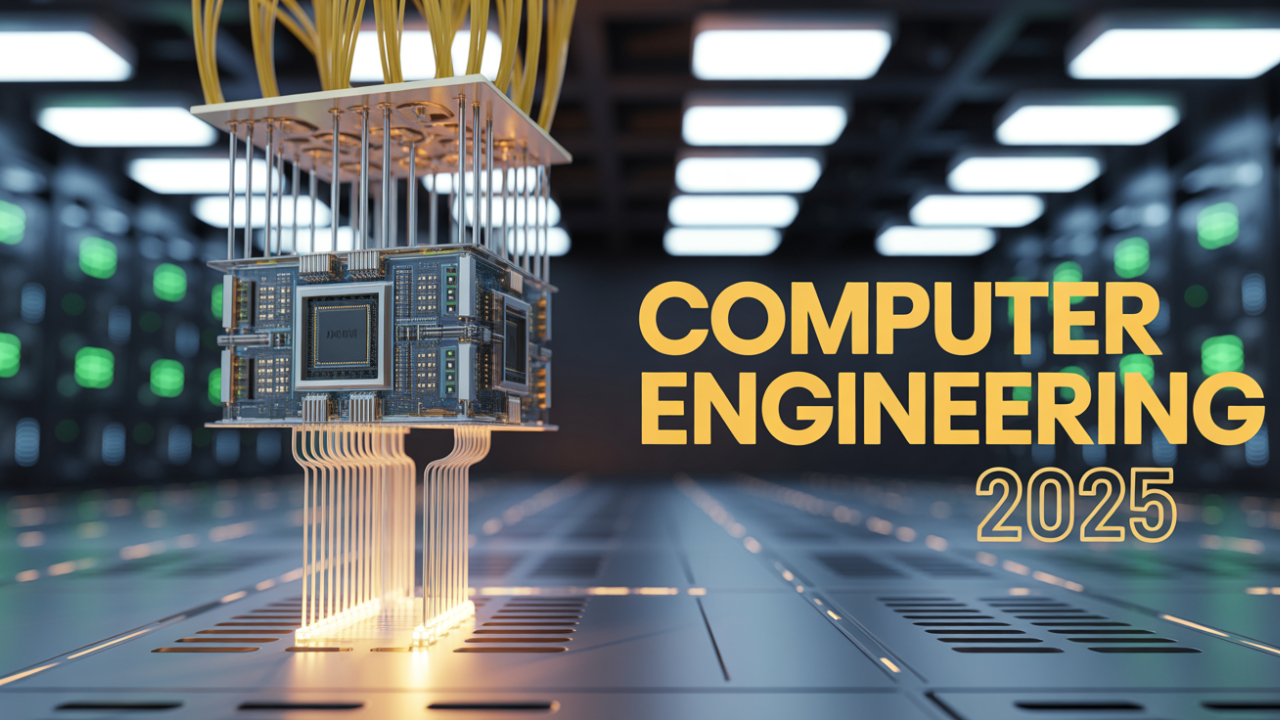So why are people, maybe even people you know who you think aren’t as smart as you, still landing jobs that pay over $200,000 a year? What do they know that you don’t?
The truth is that while one door might be closing, another one is being blown wide open. The demand for a very specific set of skills, skills that are uniquely taught in a computer engineering program, is about to explode. In this article , we are pulling back the curtain. We’re going to show you the real, non-inflated salaries you can expect at every level. We’ll break down the exact skills that are in high demand right now. And we’ll walk you through what day-to-day life actually looks like, from the brutal student grind to the reality of a six-figure professional. Stick around, because this could be the difference between choosing a degree that leads to a dead end and choosing one that makes you one of the most valuable professionals in the world.
ILIPUTER- International Computer Manufacturing Co.
Introduction of Computer Engineering
Let’s be honest, you’re here because you’re standing at a confusing crossroads. The internet is screaming at you from all directions. One guru tells you college is a scam and you should just teach yourself to code. Another shows you a “day in my life” as a software engineer that looks more like a vacation than a job. Meanwhile, your parents, teachers, and counselors are probably pushing you towards a “safe” and “stable” career, but they can’t quite define what that means in 2025.
My goal here is to cut through all that noise. My name is Jon, and for the past 10 years, I’ve been a computer engineer, working right in the trenches of the tech industry. I’ve been that student struggling through impossible circuit analysis classes, I’ve been the new grad sweating through technical interviews, and I’ve been the professional working on the very systems that are shaping our future. I’m not here to sell you a course or a dream. I’m here to give you a no-nonsense, data-backed guide to what a computer engineering degree means for your career, your wallet, and your life in 2025 and beyond.
You’re right to be concerned. You’re right to be asking these hard questions. Choosing a major is one of the biggest investments you’ll ever make. My promise is that by the end of this article , you will have the clarity you’re looking for. We’re going to break this down into three parts: First, the money—salaries and real job demand. Second, the exact skills companies are begging for. And third, the day-to-day reality, warts and all. Let’s get into computer engineering.
Section 1: The “Problem” – The Big Question of Computer Engineering
Before we talk about solutions, we have to respect the problem. And the problem is a giant, tangled knot of legitimate fears. Let’s untangle it, one fear at a time.
First, the big one: Is the market completely saturated? You see it everywhere. Every other person on social media is “learning to code.” Thousands of graduates are pouring out of universities, plus a tidal wave of people from coding bootcamps, all fighting for the same entry-level jobs. And some data seems to confirm this. Recent analysis using U.S. Census Bureau data has shown that in 2023, tech-related fields faced higher unemployment rates compared to more traditional engineering disciplines like civil engineering. It feels like you’re trying to get on a train that’s already full, with a huge crowd still on the platform. So, is it hopeless? Is getting a job just a lottery ticket? This is a serious concern, and we’re going to address exactly why a computer engineering degree gives you a specific advantage here.
Second, the existential threat: Will AI make my job obsolete? This isn’t science fiction anymore. You’ve seen the demos. AI can write code. It can debug. It can even pass some software engineering interviews. Every week a new, more powerful model comes out that seems to chip away at tasks you thought were for humans only. People are doom-posting online that in five years, the need for human coders will be a fraction of what it is today. They say getting a tech degree now is like training to be a blacksmith when the first cars started rolling out. The anxiety is real: why spend four years and tens of thousands of dollars on a degree just to be replaced by an algorithm? You’re worried you’ll graduate with a skillset that’s already been automated. This is maybe the most important question of our time, and the answer is way more nuanced, and frankly more optimistic for computer engineers, than you might think.
Third, the personal struggle: Is it just too hard? Is the grind worth the reward? Let’s not sugarcoat it. A computer engineering degree is brutal. It’s a relentless gauntlet of advanced math like multivariable calculus and differential equations. It’s mind-bending physics. It’s late nights in a lab, staring at an oscilloscope, trying to figure out why your circuit isn’t doing what the theory said it would. It’s debugging C++ code for hours only to find the error was a single missing semicolon. You look over at your friends in other majors, and it seems like they have a social life, they get sleep, and they’re not constantly on the edge of a breakdown. You have to ask yourself: Is all this pain and sacrifice really going to pay off? Is the pot of gold at the end of the rainbow big enough to justify walking through the storm?
And finally, a basic point of confusion: What even is Computer Engineering? How is it different from Computer Science or Electrical Engineering? This question plagues so many students. In simple terms, think of it like this: Electrical Engineering is about the physical components—the physics of electricity, transistors, and power systems. Computer Science is about the theory of computation, algorithms, and the software that runs on the machine. Computer Engineering is the essential bridge between them. A computer engineer understands both the hardware and the software. They know how to write the code (like a CS major) and they also get how that code interacts with the physical silicon of the processor and memory (like an EE major). This unique, hybrid nature is the secret weapon we’ll be talking about. It’s the key to answering all the fears we just laid out.
So yes, the concerns are valid. The market looks crowded, the AI monster is at the door, and the education is a marathon of intellectual pain. Now, let’s talk about why, despite all of this, 2025 is arguably one of the best times in history to be a computer engineer.
Section 2: The “Solution” – The 3-Part Breakdown of Computer Engineering
Part 1: The Real Salaries and Job Demand
Alright, let’s talk about the number one reason most people even consider this field: the money. And to be clear, the numbers are life-changing. But it’s not about one flashy number. It’s about the entire financial journey of your career.
Let’s look at the real numbers. Data from sources like Coursera show the median total salary for a computer engineer is well into the six figures, often around $116,287 a year, which includes bonuses on top of a base salary in the low $90,000s. Top earners, of course, push much higher, with salaries reaching $122,000 and beyond. And that’s not even counting specialized roles. For instance, the U.S. Bureau of Labor Statistics reports a median salary for computer hardware engineers at $155,020.
But I know what you’re thinking. Those are averages. What about me, starting from zero? What can a fresh graduate actually make? Realistically, you’re probably not going to walk out of college into a $150,000 job, no matter what some influencers say. According to the National Association of Colleges and Employers (NACE), the projected starting salary for computer sciences majors in the class of 2025 is about $84,960. Computer engineering is in the same ballpark, with other reports showing entry-level pay between $76,000 and $82,250. So let’s call it around $80,000 to be realistic. You can’t make the mistake of looking at that number in a vacuum. This is one of the highest starting salaries of any bachelor’s degree you can get. While your friends in other fields might be starting in the $50k or $60k range, you’re on a totally different financial playing field from day one. That’s not a failure; that’s the first step on a very steep upward ladder.
And that ladder is where it gets really exciting. Your salary doesn’t stay at that entry-level number for long. After just a couple of years, you move into a mid-level role, and your salary quickly climbs toward the $100,000 mark. Then, around the five-to-eight-year mark, you step into a senior role. This is where your earnings take a huge leap. Senior engineers are comfortably clearing $150,000, and principal engineers—the ones who guide technical strategy for entire teams—are earning well over $200,000. That progression from $80k to over $200k can happen within a decade. That’s the power of this career path.
But we’re still just scratching the surface. The real money in 2025 isn’t just in being a generalist; it’s in specializing. This is how you fight back against the fear of AI and saturation. A generic coder might be replaceable, but a specialist is indispensable. Take Artificial Intelligence and Machine Learning. While it’s hard to pin down an exact number, engineers with these skills consistently command a significant salary premium over their peers. Think about that. The very technology that people fear is replacing them is the one that will pay you more than anyone else. Companies are desperate for engineers who can not only use AI but build the hardware and infrastructure that runs it—a skill tailor-made for computer engineers. The same goes for cybersecurity, cloud computing, and DevOps.
Of course, salary is influenced by location. A job in San Francisco will pay more than one in a smaller city. But the remote work revolution has changed the game, uncoupling salary from location for many roles. You could potentially earn a salary competitive with a major tech hub while living somewhere with a lower cost of living, drastically increasing your real income. The flip side is you’re now competing in a global talent pool, which makes having a strong, specialized skillset more important than ever.
Now, let’s talk demand. A high salary means nothing if you can’t get a job. This is where we confront that scary unemployment talk head-on. Yes, there’s short-term volatility and more competition at the entry-level. But the long-term outlook is overwhelmingly positive. The U.S. Bureau of Labor Statistics (BLS) projects a jaw-dropping 25% job growth for software developers between 2022 and 2032. That’s not a typo. The average growth rate for all jobs is just 3%. So this field is growing more than eight times faster than average. On the hardware side, the BLS projects 7% growth for computer hardware engineers through 2034, which is still more than double the national average.
Why so much demand? Because every company is a tech company now. Your bank is a tech company with a banking license. Your car is a computer on wheels. Retail, healthcare, entertainment—they are all being transformed by software and hardware, and they all need people who can build and maintain their digital infrastructure.
This brings us to the computer engineer’s secret weapon: versatility. When the market shifts, you can shift with it. If there’s a downturn in consumer electronics (hardware), you can pivot to a role in cloud infrastructure (software). If web development gets oversaturated, you can pivot to embedded systems for IoT devices. A computer science major might struggle to get a hardware design job, and an electrical engineer might be overlooked for a machine learning role. You, the computer engineer, are qualified to compete for both. This flexibility is your ultimate job security in computer engineering.
Part 2: The Skills in High Demand
A six-figure salary and high demand are the destination, but skills are the vehicle. So, what do you actually need to learn? This is where the computer engineering curriculum shines, because it builds your skills in a layered, foundational way that self-taught paths or bootcamps just can’t match.
The most important thing a Computer Engineering degree gives you isn’t a specific programming language; it’s a way of thinking. It trains you to be a systematic problem-solver. You learn to break down a massive, complex problem into smaller parts, solve them, and then put them back together into a working system. This is the essence of engineering. You learn to think in terms of systems, trade-offs, performance, and reliability. This mental framework is language-agnostic and timeless. It’s why engineers can pick up new technologies so quickly. They have the mental models to understand the why, not just the how.
With that foundation, let’s build the pyramid of skills. At the base are the non-negotiable hard skills.
First, Programming Languages. You need to be able to learn new languages quickly, but a computer engineer should focus on a specific spectrum.
- C and C++: These are the languages of power and control. For a computer engineer, they’re essential. They let you work at a low level, directly manage memory, talk to hardware, and write code where every nanosecond counts. This is the language of operating systems, game engines, and embedded systems. A computer science major might try to avoid C++, but for a computer engineer, it’s your native tongue.
- Python: If C++ is about control, Python is about speed of development and its total dominance in AI and Machine Learning. Its simple syntax and huge library ecosystem (TensorFlow, PyTorch) make it the default for data science and AI. Being able to write a high-performance algorithm in C++ and then prototype an AI model in Python makes you incredibly valuable.
- Hardware Description Languages (HDLs) like Verilog and VHDL: This is what truly separates a computer engineer from a pure software developer. These aren’t programming languages; they are languages used to describe digital circuits. You use them to design the actual chips—the processors and controllers—that all software runs on.
- Java and JavaScript: Java is still a titan for large-scale enterprise apps and Android development. JavaScript, once just for web pages, is now a full-stack powerhouse with Node.js. Knowing these is key for building complete products.
- Emerging Languages like Rust and Go: Keeping an eye on the future is critical. Rust is gaining huge traction for its focus on safety and performance, aiming to replace C++. Go is prized for its simplicity and handling of concurrent tasks, making it great for cloud services. Knowing about these shows you’re a forward-thinking engineer.
Next, you absolutely need a deep understanding of Data Structures and Algorithms (DS&A). This isn’t just a hurdle for job interviews; it’s the fundamental science of organizing information efficiently. It’s the difference between code that works and code that works at scale. It’s knowing when to use a hash map versus a tree. It’s understanding Big-O notation so you can predict how your code will perform with ten million users instead of just ten.
Then there’s System Design. If DS&A is about writing efficient code, System Design is about building efficient systems. This is what separates a junior engineer from a senior one. It’s the ability to answer questions like: How would you design a service like Twitter? How do you handle a billion requests a day? It involves thinking about architecture, distributed systems, caching, and databases. Your degree prepares you for this with courses on computer architecture and operating systems—the building blocks of any large-scale system.
Now for the “money skills” for 2025. These are the specializations built on that strong foundation.
Artificial Intelligence and Machine Learning is at the absolute peak. For a computer engineer, this isn’t just running a Python script. It’s understanding the full stack. It’s knowing how to design hardware accelerators like GPUs or custom chips that can train and run massive neural networks efficiently. It’s about optimizing ML models to run on tiny embedded systems, like in a car or a drone. This fusion of hardware and software is your unique advantage in the age of AI.
Cloud Computing and DevOps are no longer optional. You must be familiar with at least one major cloud platform—AWS, Azure, or Google Cloud. You need to understand core services for computing, storage, and networking. More than that, you need the DevOps mindset. This means automation, infrastructure as code (using tools like Terraform), and CI/CD pipelines. CI/CD (using tools like GitHub Actions) is the automated assembly line for software, letting teams build, test, and release code quickly and reliably.
Cybersecurity has become a critical concern for every company. A data breach can destroy a business. So, engineers who think with a security-first mindset are invaluable. This means understanding secure coding practices, encryption, network security, and how to find vulnerabilities in a system before they are exploited. With your hardware knowledge, you can even specialize in areas like secure boot and hardware-level exploits.
Finally, we can’t forget the skills that get you hired and promoted: Soft Skills. You can be the most brilliant coder in the world, but if you can’t communicate your ideas or work in a team, your career will stall.
- Communication: Can you explain a complex technical idea to a non-technical manager? Can you write clear documentation?
- Teamwork: The myth of the lone coder is dead. Modern development is a team sport, often using Agile methods like daily stand-up meetings and sprints.
- Adaptability and Continuous Learning: This is the most crucial skill. The tech you use today will be different in five years. Your degree teaches you how to learn. Your career will be one of constant upskilling. Your ability to embrace change will define your success for getting your computer engineering degree.
This mix of a deep theoretical foundation, practical hard skills, and essential soft skills is what makes a computer engineering graduate so formidable.
Part 3: The Day-to-Day Reality
We’ve talked about the money and skills, but what does it actually feel like? What is the day-to-day life of a student, and then a professional?
Let’s start with a real look at the life of a computer engineering student. A typical day is a marathon. It might start with an 8 AM lecture on differential equations. Then you run to a computer science class on algorithm analysis, where your brain gets twisted into knots.
The afternoon is for hands-on work. You’ll spend hours in a digital logic design lab, not just writing code, but sitting at a bench with a breadboard, a tangle of wires, and an oscilloscope. You’re trying to build a physical circuit that adds two numbers, and for hours, it just won’t work. It’s frustrating and meticulous.
Your day isn’t over. After dinner, you’re in the library with classmates. You have a C++ programming assignment due, and your program keeps crashing with a “segmentation fault.” You’ll spend hours, sometimes until 2 or 3 AM, hunting down that one elusive bug.
This is the grind. It’s a constant blend of the highly theoretical and the frustratingly practical. It’s this struggle, this trial by fire, that forges you into an engineer. It builds resilience and hones your problem-solving instincts. It’s why companies pay so much for graduates of these programs—they know you survived an intellectual boot camp.
Now, let’s fast forward. You graduated and landed that job. What does your day in the life as a professional computer engineer look like? It varies a lot by role.
Imagine you’re a Software Engineer at a tech company. Your day probably starts around 9 AM with a quick 15-minute “daily stand-up” meeting where your team syncs up. After that, it’s “deep work.” Headphones on, notifications off, you’re immersed in writing code for a new feature. Around noon, you might have a code review, where you check a teammate’s work for bugs and improvements. The afternoon might bring a meeting with a product manager to debate the next feature, followed by fixing a bug that a customer just reported. Coding is just one part of the job; a huge amount of your time is spent on communication, collaboration, and problem-solving.
Now, imagine you’re a Hardware or Embedded Systems Engineer making smart home devices. Your morning might be in an electronics lab, not in front of a code editor. You could be using a soldering iron on a new prototype or hooking up a logic analyzer to diagnose a corrupted signal. In the afternoon, you might be writing low-level firmware in C to control that hardware. You’re working with very limited memory and power, so every line of code has to be incredibly efficient. It’s a different kind of satisfaction when you write code that makes a physical object light up or move for the first time.
Or, let’s say you’re an AI/ML Engineer. Your day might feel more like a scientist’s. You might start by cleaning a gigantic dataset. Then you could spend a few hours writing a Python script with PyTorch to define a neural network. The actual model training might take hours or days on a cluster of GPUs. While it’s running, you might be reading the latest research papers. Once it’s done, you analyze the model’s performance, figure out why it’s making certain mistakes, and then iterate to improve it.
Despite the differences, there are common threads. First, your entire day is about problem-solving. Whether it’s a software bug, a hardware glitch, or an inaccurate AI model, your job is to be a professional problem-solver. Second, collaboration is constant. Third, and most importantly, you are always learning. You’ll spend part of almost every day reading documentation or asking a senior engineer for help. Being a computer engineer isn’t about knowing everything; it’s about being really good at figuring things out.
Conclusion: Is It Worth It?
So, we come back to the big question we started with: Is a computer engineering degree still worth it in 2025?
We’ve looked at the evidence. We confronted the scary headlines about a competitive market. We stared directly at the AI revolution. We acknowledged the brutal difficulty of the degree itself.
But then, we looked at the other side. We saw that the salaries are not just good; they are life-altering, with a clear path to earning well over $150,000 or even $200,000. We saw that the long-term job demand isn’t just growing; it’s exploding at a rate over eight times faster than the average occupation for software roles.
We broke down the unique skillset this degree gives you—a powerful fusion of hardware and software knowledge that makes you incredibly versatile. We saw that AI isn’t a death sentence; it’s the single greatest opportunity for a computer engineer. You’re the one who can design the custom chips that run AI, write the low-level software to make it efficient, and build the intelligent systems of the future. The very thing that threatens a generic coder is a specialization that demands a salary premium for you.
So, after laying out all the facts, the answer is yes. A computer engineering degree is absolutely still worth it in 2025.
But—and this is the most important part—it’s not a golden ticket. It’s not a piece of paper you trade in for a six-figure check.
It’s worth it if you’re genuinely curious about how things work, from the electrons in a transistor to the algorithms that power our world. It’s worth it if you’re a tenacious problem-solver, someone who gets a strange satisfaction from hunting down a bug for hours. It’s worth it if you’re prepared for the academic grind. And most of all, it’s worth it if you commit to being a lifelong learner, because the one guarantee is that the technology will change.
The world as we know it is being rebuilt with silicon and software. Autonomous vehicles, personalized medicine, space exploration—all of it runs on the work of engineers. A computer engineering degree doesn’t just give you a job; it gives you a chance to help build the future.
The question was never really whether the degree is worth it. The value is undeniable. The real question is, are you ready to do the work to be worth the degree?







